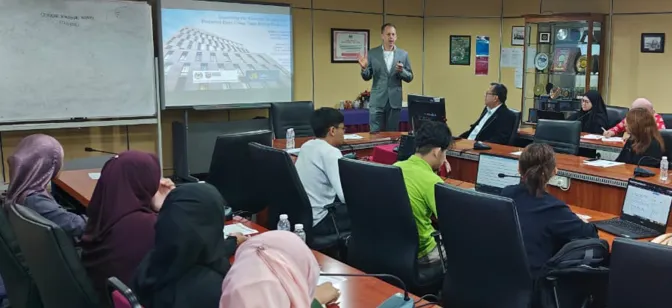
LeBow Researchers Join a Movement to Benefit Society Using Forecasting Models
As a statistics researcher, Assistant Professor of Decision Sciences Matthew Schneider, PhD, has been publishing on forecasting and attending conferences on the topic since 2008. That period began with “big data,” with major companies collecting massive amounts of data and conducting analyses on an unprecedented scale.
Schneider’s research interests in data privacy and forecasting have aligned him with other researchers in operations research, statistics and related areas seeking to apply their expertise to major societal issues throughout the world. A group of these experts working in both academia and industry have founded Forecasting for Social Good (F4SG), and Schneider’s research on data protection methods that protect individuals’ privacy falls under this category.
“I was trying to find a way to combine my two areas of interest, and together with my colleague Jinwook Lee, our paper fit the bill of improving the social good,” he said.
That paper, “Protecting Time Series Data with Minimal Absolute Change to Forecasts” by Schneider and Assistant Professor of Decision Sciences Jinwook Lee, PhD, creates two methods for protecting individuals’ data without greatly changing the forecasts. Additionally, the International Symposium of Forecasting, the premier conference in the field, dedicated a special session to these topics last year as well.
Schneider and Lee identify areas of application for their data protection methods that may include sensitive data such as forecasting job creation or cross-border human trafficking flows. Their methods could help governments and NGOs use forecasts to provide social services in advance to those in need while keeping data about those individuals and their identities private.
Jade Zhang, a first-year PhD student in operations and business analytics, is serving on F4SG’s board and has been working on organizing a series of guest speakers on topics relating to bias, ethics and fairness. She has met regularly with F4SG founder Bahman Rostami-Tabar, who built on his prior forecasting research by traveling throughout the developing world and holding free forecasting workshops to train locals so they could forecast the needs of the population more accurately. His paper in the International Journal of Forecasting outlines the group’s vision “to [use] the forecasting process to advance social and environmental objectives such as equality, social justice and sustainability.”
Zhang’s interest in using statistical models and forecasting arose during her graduate studies at Clark University, where she studied bias in medical diagnostic platforms used in healthcare settings, and she found herself inspired by reading Rostami-Tabar’s paper.
“When I saw it, I said, that’s what I want to do!” she said.
Through her meetings with Rostami-Tabar and other academic experts affiliated with F4SG, Zhang says, “I’m seeing where I can fill in the gaps in my own knowledge, what I can improve and what I can do in the future.”
With the renewed interest in forecasting research, both in academia and by companies needing to forecast millions of time series, Schneider hopes that his ongoing research and affiliation with F4SG can empower Zhang and other PhD students to build their careers and effect change in the world.
“We can explore ethics, bias and fairness with a data-driven perspective,” he says. “For example, if F4SG can forecast water availability better, we can help all people without access to a consistent supply of clean drinking water.”



